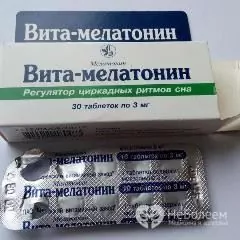- Author Rachel Wainwright wainwright@abchealthonline.com.
- Public 2023-12-15 07:39.
- Last modified 2025-11-02 20:14.
Vita-melatonin
Instructions for use:
- 1. Release form and composition
- 2. Indications for use
- 3. Contraindications
- 4. Method of application and dosage
- 5. Side effects
- 6. Special instructions
- 7. Drug interactions
- 8. Analogs
- 9. Terms and conditions of storage
- 10. Terms of dispensing from pharmacies

Vita-melatonin is a drug with hypnotic and sedative effects.
Release form and composition
Vita-melatonin is produced in the form of tablets: flat-cylindrical, white, with a risk and a chamfer (10 pcs. In blisters, 3 blisters in a cardboard box).
The composition of 1 tablet includes:
- Active ingredient: melatonin - 3 mg;
- Auxiliary components: potato starch, microcrystalline cellulose, lactose monohydrate, calcium stearate.
Indications for use
- Disorders of the circadian rhythm "sleep-wake" associated with a change in time zones and manifested in the form of increased fatigue (treatment and prevention);
- Hypertension (stages I-II) and high blood pressure in elderly patients (along with other drugs);
- Sleep disorders, incl. chronic insomnia of functional origin, insomnia in the elderly (including disorders associated with hypercholesterolemia and hypertension).
Vita-melatonin is also prescribed to increase physical and mental performance and to alleviate seasonal depressive conditions and stress reactions.
Contraindications
Absolute:
- Myeloma, diabetes mellitus, epilepsy, autoimmune diseases, leukemia, lymphogranulomatosis, lymphoma;
- Simultaneous use with monoamine oxidase inhibitors, corticosteroids, cyclosporine;
- Lapp lactase deficiency, galactose intolerance or glucose-galactose malabsorption;
- Childhood;
- Pregnancy and lactation;
- Hypersensitivity to drug components.
Relative (the use of Vita-melatonin requires caution in the presence of the following diseases / conditions):
- Hormonal disorders and / or hormone therapy;
- Allergic diseases;
- Liver cirrhosis (due to a decrease in the metabolic rate of melatonin).
Method of administration and dosage
Vita-melatonin is taken orally.
For therapeutic purposes, 1-2 tablets are prescribed per day every day, preferably at the same time (30 minutes before bedtime). The therapy is carried out until the physiological rhythm "sleep-wakefulness" is restored, but no longer than 1 month.
For prophylaxis, Vita-melatonin is usually prescribed in the same dosage. The duration of taking the drug is determined by the doctor individually, taking into account the course of the disease and the individual characteristics of the patient. As a rule, 2 courses of 30 days are carried out with a break of 7 days between courses.
For the treatment of chronic sleep disorders (including disorders associated with hypercholesterolemia and / or concomitant hypertension) in elderly patients, Vita-melatonin is prescribed 1 time per day in the minimum effective dose of 1/2 tablet (1.5 mg) 30 minutes before bedtime. In case of insufficient effectiveness, it is possible to increase the dose by 2 times. Cancellation of the drug should be with a gradual dose reduction for 7-14 days.
According to the same scheme, Vita-melatonin should be taken in case of hypertension and high blood pressure in elderly patients. You can carry out 3-6 courses for 30 days with seven-day breaks between them.
Side effects
During the use of Vita-melatonin, disturbances from some body systems may develop (≥1 / 10 - very often; from 1/100 to 1/10 - often; from 1/1000 to 1/100 - infrequently; from 1/10 000 up to 1/1000 - rarely; <1/10 000 (including single messages) - very rare):
- Cardiovascular system: rarely - palpitations, angina pectoris;
- Central nervous system: infrequently - migraine, dizziness, increased psychomotor activity, drowsiness; rarely - impaired sleep quality, decreased attention, memory impairment, paresthesia;
- Gastrointestinal tract: infrequently - constipation, abdominal pain, dry mouth, ulceration of the mouth; rarely - flatulence, vomiting, abnormal intestinal murmurs, bad breath, increased salivary secretion, gastroesophageal reflux;
- Blood and lymphatic system: rarely - thrombocytopenia, leukopenia;
- Hepatobiliary system: infrequently - hyperbilirubinemia; rarely - functional disorders of the liver, increased activity of hepatic enzymes, deviation from the norm of these laboratory tests;
- Genitourinary system: infrequently - proteinuria, glucosuria, menopausal symptoms; rarely - priapism, polyuria, nocturia, hematuria, prostatitis;
- Skeletal muscles and connective tissue: infrequently - pain in the limbs; rarely - neck pain, muscle spasms, arthritis;
- Vascular disorders: rarely - hot flushes;
- Infections and invasions: rarely - shingles;
- Skin and subcutaneous tissue: infrequently - night sweats, dermatitis; rarely - psoriasis, dry skin, eczema, itchy rash, erythema, itching, nail damage;
- Metabolism: rarely - hypocalcemia, hypertriglyceridemia, hyponatremia;
- Mind: infrequently - unusual dreams, irritability, restlessness, increased excitability, insomnia; rarely - aggressiveness, mood changes, agitation, early morning awakening, tearfulness, increased libido, depression;
- The organ of hearing and vestibular apparatus: rarely - dizziness when changing body position;
- Organs of vision: rarely - blurred vision and decreased visual acuity, increased lacrimation;
- Other disorders: infrequently - an increase in body weight; rarely - a change in electrolytes;
- General disorders: infrequently - chest pain, asthenia; rarely - thirst, fatigue.
special instructions
Due to some contraceptive effect, Vita-melatonin is not recommended for women planning pregnancy.
During therapy, bright lighting should be avoided.
The drug can be used in patients with hypercholesterolemia and high blood pressure (especially systolic). With prolonged therapy in patients with hypercholesterolemia, the level of cholesterol decreases, but this does not affect the level of cholesterol in the case of its normal content in the blood serum. Vita-melatonin lowers the level of glucose and insulin in the blood plasma, therefore it can be used in patients with hypercholesterolemia and essential hypertension, accompanied by insulin resistance (HOMA index is above 3 conventional units).
Due to the fact that melatonin can cause drowsiness, the drug should be used with caution in cases where the probable drowsiness may be associated with a danger or risk to the patient's health.
Simultaneous intake with alcohol decreases the effectiveness of melatonin.
Vita-melatonin should be used with caution in patients whose activity requires a high speed of psychomotor reactions and increased concentration of attention.
Drug interactions
With the simultaneous use of Vita-melatonin with certain drugs, the following effects may occur:
- Drugs that block β-adrenergic receptors, fluvoxamine, dexamethasone, clonidine and some other drugs: change in the secretion of endogenous melatonin;
- Hormonal drugs (estrogens, androgens, etc.), benzodiazepine: influence on their effectiveness (with simultaneous use, medical supervision is necessary);
- Tamoxifen: potentiation of its antitumor effect;
- Methamphetamine: enhancing its dopaminergic and serotonergic effects;
- Isoniazid: potentiation of its antibacterial action;
- Lisinopril: enhancement of its effect (simultaneous use is possible during antihypertensive therapy in patients with functional pineal insufficiency);
- Fluvoxamine: increasing the level of melatonin by inhibiting its metabolism by hepatic isoenzymes CYP2C19 and CYP1A2 cytochrome P450 (CYP), a combination of drugs is not recommended;
- 5- or 8-methoxypsoralen, cimetidine, estrogens (for example, contraceptives or hormone replacement therapy): increased plasma melatonin levels (medical supervision is necessary);
- CYP1A2 inhibitors (eg quinolones): help to enhance the action of melatonin;
- CYP1A2 inducers (for example, rifampicin, carbamazepine): helping to reduce the concentration of melatonin in blood plasma.
Smoking can lower melatonin levels.
Analogs
Vita-melatonin analogs are: Circadin, Melaxen, Melatonin.
Terms and conditions of storage
Keep out of reach of children in original packaging at temperatures up to 25 ° C.
The shelf life is 3 years.
Terms of dispensing from pharmacies
Dispensed by prescription.
Information about the drug is generalized, provided for informational purposes only and does not replace the official instructions. Self-medication is hazardous to health!






